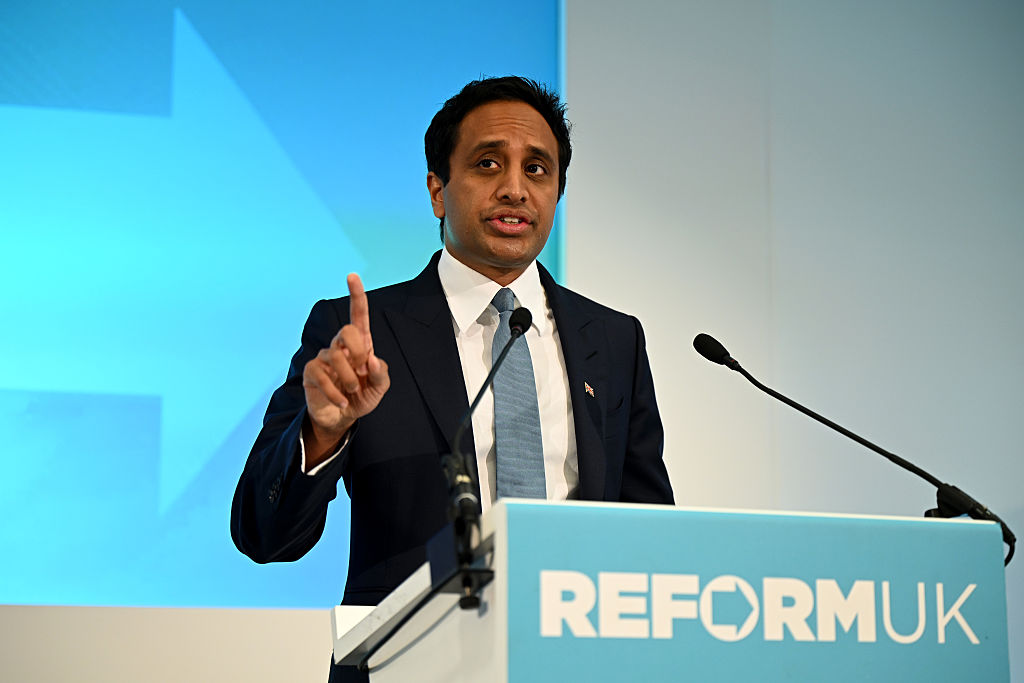Not so long ago, an MP was free to earn whatever he liked however he liked, push off without impediment to work for businesses that he’d been responsible for regulating, and could hold his seat comfortably for the best part of 50 years. No longer.
One might have thought that the stock of MPs would therefore have risen. But it hasn’t: the more ethically we compel them to behave, the more unpopular they seem to become.
So congratulations to Zia Yusuf, Reform’s former party chairman – and one of Nigel Farage’s closest colleagues – for taking our detestation of MPs to its logical conclusion: namely, stopping them governing us altogether. In a manner of speaking.
Yusuf has declared that a Reform government will appoint ‘household names’ with ‘galactic-level talent’ to the Cabinet – many of whom won’t be MPs at all. ‘We don’t think it makes sense necessarily for the minister of defence to also be doing constituency surgeries about the chlorine level in the local swimming pool.’
It should be conceded that Yusuf is only following where Rishi Sunak has already gone. If the latter could bring back David Cameron as Foreign Secretary – seven years after he had left the Commons – why shouldn’t a prime minister Farage do much the same?
Sunak appointed Cameron to the Lords and, in doing so, was acting in a way that has become increasingly common. Cameron himself made Jim O’Neill, a former chief economist at Goldman Sachs, a Treasury minister in the Lords. Gordon Brown had his ‘Goats’ – Andrew Adonis, Meghnad Desai, Alan West, Mark Malloch Brown – who were appointed as ministers in Brown’s ‘government of all the talents’. Now Sir Keir Starmer is at it.
As I gaze across from my backbench place in the Lords to the government’s front bench, I see a mass of ministerial newcomers, many of whom have no track record in party politics: James Timpson, the prisons minister; Peter Hendy, formerly of Network Rail and Transport for London; Patrick Vallance, one of the co-architects of lockdown during Covid. Yusuf says that appointing his galactic-talent-level household names to the Lords is ‘the most likely scenario’.
He has a point. MPs have morphed over the past half-century from part-time elected representatives, speaking respectively for the interests of labour and capital, into full-time constituency workers – paid by the taxpayer. Perhaps the most sensible course to take is to cut the Gordian knot altogether: separate the executive from the legislature, and make MPs full-time legislators.
All the same, think it through.
Being a minister requires much more than galactic-level talent, though a bit of it would certainly come in useful. You have to be able to work as part of a team with people of lesser rank who can ultimately make your life impossible. You must follow an agreed government line when making your case to the public. You and your family must cope with the scrutiny, restrictions and stalkers that come with public life.
These are not conditions that business people – even those well placed in the corporate world – are used to negotiating. Let alone celebrities who don’t have to work as part of a team.
Nor is Yusuf proposing to pull ministers out of the Commons altogether. At Cabinet level, most will sit in the upper House; their juniors will toil away in the lower – while continuing to hold those constituency surgeries about chlorine levels in swimming pools. In H.G. Wells’s The Time Machine, the Eloi – elegant, ethereal beings – lord it over the Morlocks – sweaty, oppressed grunts. Is this really an example to follow?
After all, most MPs want to climb up the ladder. A mass of new Reform ones would be no different. They would not long tolerate being barred from reaching the top. Yusuf’s plans threaten discontent, disorder – and eventual chaos. Remember: the Morlocks eventually devoured the Eloi.
Finally, how would these appointed household names and galactic-level talents be accountable to people who, for all their faults, voters actually elect? Yes, they could be summoned to appear before Commons select committees. But these contain only a small proportion of MPs. So might these Lords ministers also be questioned by the whole House? But if so, what sanction would MPs have over ministers from a different chamber?
Appointing a few ministers to the Lords is one thing; putting most of the Cabinet there would be another. I’m an appointed peer myself and a supporter of the present system (perhaps unsurprisingly). Nonetheless, the fact is that I have limited democratic legitimacy – arguably, none at all. If that is true of mere opposition backbenchers, it would also be true, in spades, of a mass of Lords Cabinet ministers. Most MPs don’t have intergalactic talent. Nor are many of them household names. But they have one incontestable merit: voters can put them in and kick them out.








Comments